Are you interested in understanding how search engine results pages work?
This 101 guide will explain the basics of SERPs and what impacts your ranking.
Contents:
What Are SERPs?
Search engine results pages (SERPs) are the results that appear in a browser after a user enters keywords or queries into a search engine.
The main purpose of SERPs is to list relevant websites, articles, images, and other digital content in response to what the user is looking for.
They aim to provide people with a great experience by delivering targeted results.
Common SERP features that appear are :
- Organic search results
- Paid search results
- Local pack listings
- Image carousels
- Featured snippets
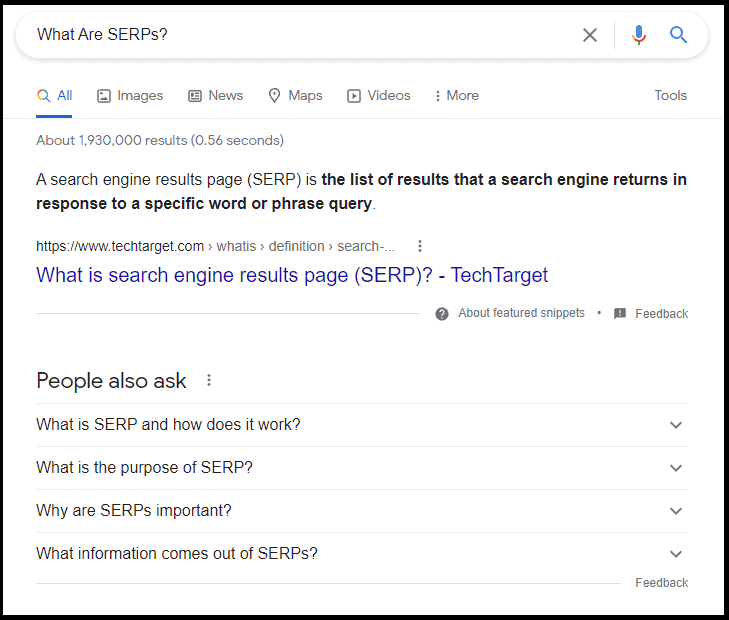
Why Are SERPs Important for SEO?
SERPs are important for SEO because they determine which websites will be visible to users after they enter keywords into a search engine.
That’s why ranking well is essential for online business owners (the higher you rank, the more likely users are to see your content).
But even if you reach number one for a specific keyword, not all results are the same.

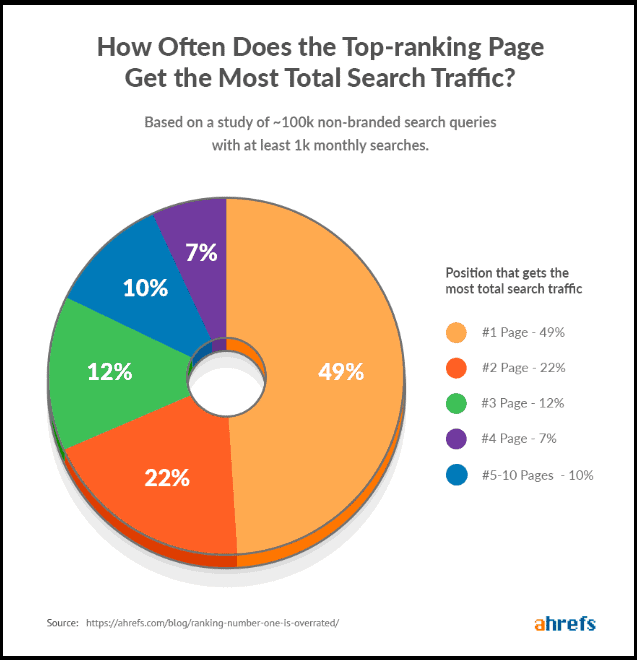
This SEO statistic is based on Ahrefs research and shows that often the top position does not get the most clicks.
For example, some SERPs may feature paid results at the top of the page, while others may have organic results.
Let’s say you rank on the first page of Google for the query “web hosting service“:

As you can see the first organic result is pushed down the page by ads and you won’t probably get many clicks, even if you rank in the first position.
But if you search for the query “SERP features“:
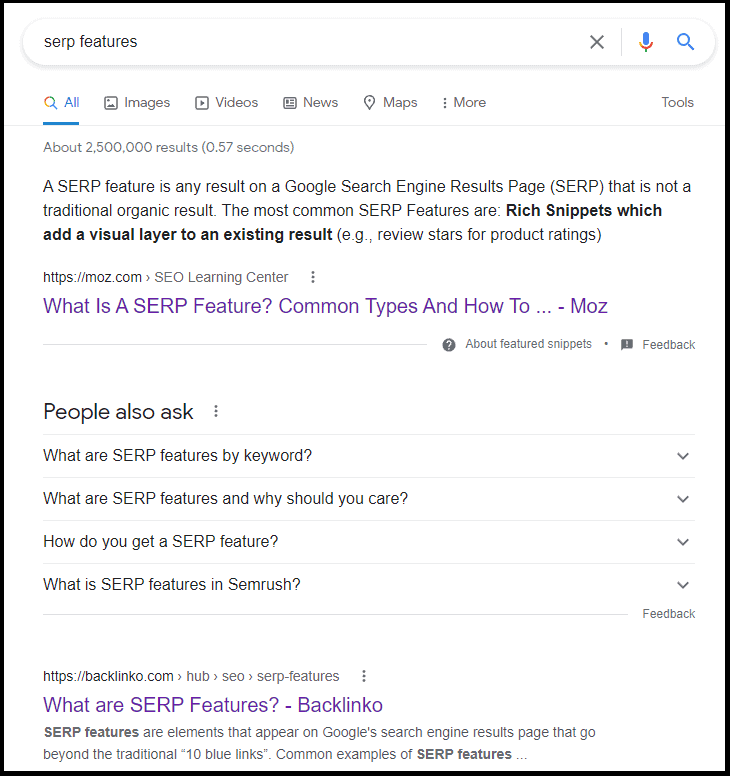
You will notice that the result page is clean of ads and the first organic result is in the top position. This will give a much better chance of getting clicks.

For example, if someone is looking to “buy web hosting“, they are likely going to make a purchase and will see different results than someone who searches for “web hosting service“.
The first one may see paid results for web hosting companies, while the latter may see a mix of organic and paid results.
Another factor to consider is the no-click searches.

Also called zero-click searches, it is when a user enters a query and finds the answer without clicking on any results.
This often happens if the answer appears in a featured snippet, image carousel, local pack listing, and in voice search results.
While this may not seem like a bad thing, it can impact your website’s traffic.

Today, around 50% of searches end without a click on organic results:
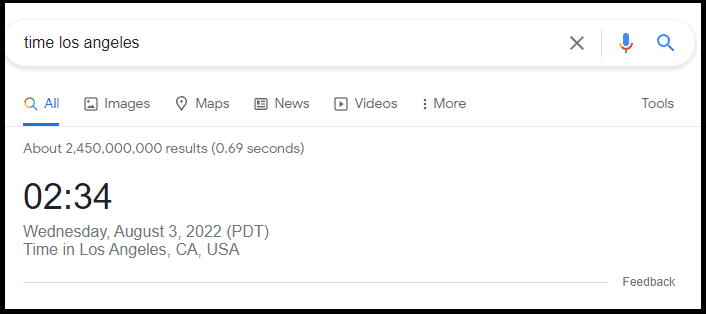
This is why it’s important to understand SERPs and how they work – so you can optimize your website accordingly and improve your ranking.
Organic Search Results
Organic search results are SERP listings that appear naturally based on complex algorithms, as opposed to being paid for by advertisers.
To appear in organic search results, SEOs optimize their website to make it as relevant and useful as possible for users. This includes using targeted keywords throughout their website’s headlines, meta tags, and body copy. But most of all, creating “helpful content“.

Of course, Google’s algorithm is secret, but we do know that they consider many factors when determining which websites should rank for a specific query.

- On-page SEO signals (for example, the keywords used in your content)
- Off-page SEO signals (one of the most important are the backlinks pointing to your pages)
- Google RankBrain
- Core web vitals
- Website loading speed
- User experience signals, such as dwell time and bounce rate
But wait, there’s more.
A traditional organic result usually includes:
- The title of the page
- A meta description
- The URL of the page

But Google sometimes adds other elements to the mix.
For example:
- Sitelinks
- Rich snippets
- Images

Sitelinks
These are links to other pages on your website.
They usually appear when your website is a top result for a specific query.
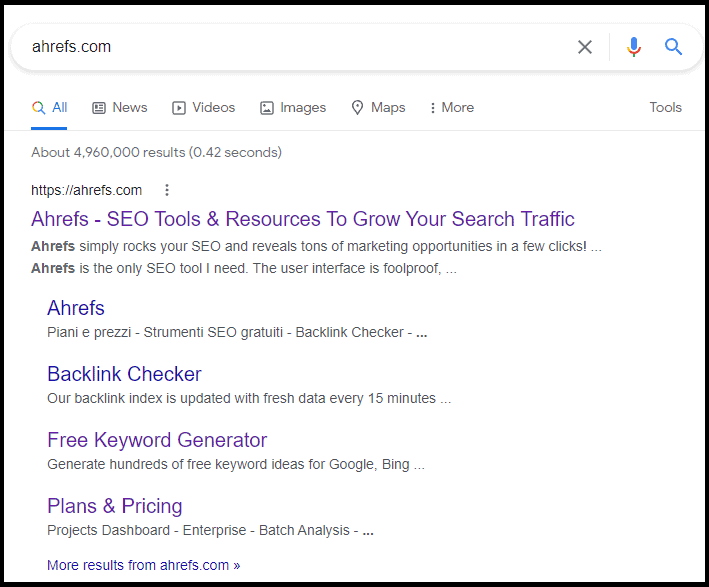
Rich snippets
Rich snippets are additional pieces of information that appear on your listing, such as customer ratings, the number of reviews, or author information.
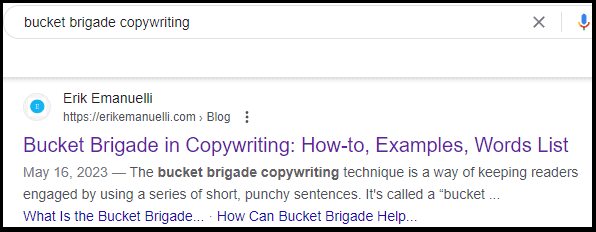
Images
These are images that appear on your listing, either in addition to your meta description or instead of it.
To get your content featured in rich snippets, you can use Schema markup.

Paid Search Results
Paid search results are advertisements that appear on a SERP after a user enters keywords or key phrases into a search engine.
They are marked with a small “Ad” icon to distinguish them from organic results, as you can see from this example for the query “best blogging outreach services“:
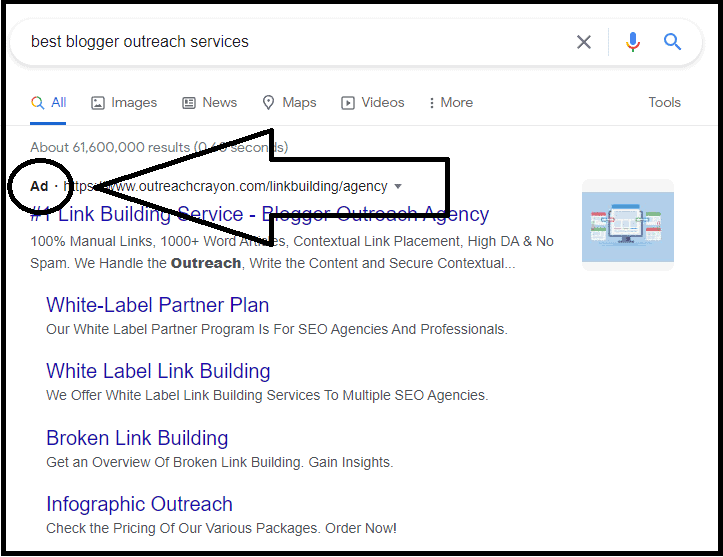
According to RankRanger, ads appear on 42.97% of page one SERPs, with an average of 3.12 ads per page (when ads are shown).
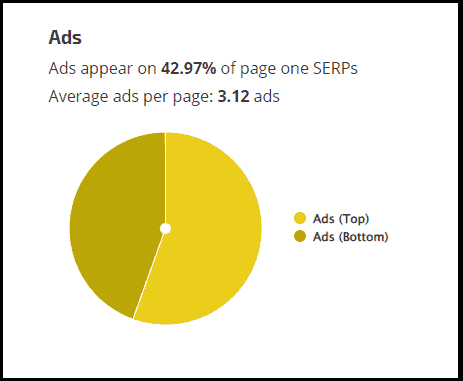
Advertisers can create paid search ads through Google Ads, Microsoft Advertising, or Yahoo Gemini. They can also create ads through other ad networks that partner with search engines.
Paid search results are determined by an auction system in which advertisers compete to have their ad shown for a specific query. The factors that determine the winner of the auction are:
- The advertiser’s Quality Score
- The advertiser’s Maximum CPC Bid
- The format of the ad
When an advertiser’s quality score and maximum CPC bid are high, their ad is more likely to be shown.
But let me tell you more.

For example, Google Shopping ads are always shown above organic results, while text ads are usually shown below them.
Paid search results usually include:
- The title of the ad
- The URL of the landing page
- The advertiser’s name or brand
- A call-to-action (for example, “Learn More”)

Search Engine Positioning
Search engine positioning (SEP) is the process of optimizing a website’s SEO so that it ranks as high as possible in SERPs.
This is important because the higher a website ranks, the more likely it is to be seen by potential customers.
According to FirstPageSage, the first three positions in the SERPs receive the most clicks:
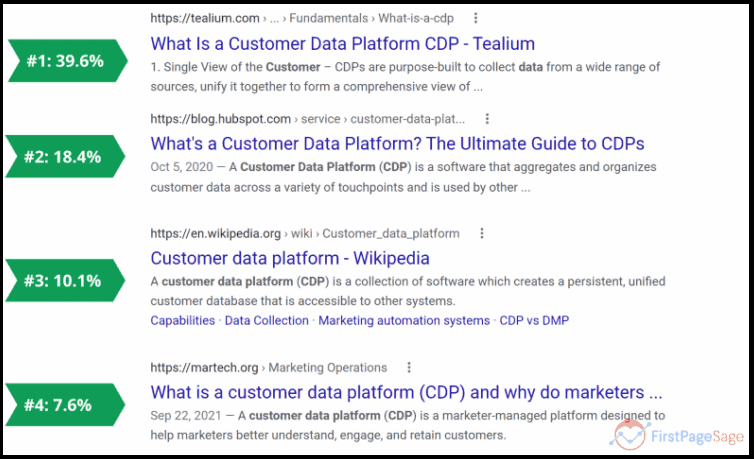
As you can see, if you move up just one spot, you can see a 30% increase in traffic.
If you move up two spots, you can see a 60% increase in traffic.
Now, let me tell you something.
Search engine optimization can be done by working on creating user-first content, earning backlinks with natural anchors, and improving other SEO factors.
So, what are some of the best practices to follow?
Here are some of the most effective ones:
- Use Internal Linking
- Optimize for Organic CTR
- Improve Core Web Vitals
- Cover a Topic In-Depth
- Decrease Your Site Loading Time
Use Internal Linking
Internal linking is the process of linking to other pages on your website.
It helps users navigate your site and find the information they’re looking for.
It also tells search engines which pages are important, so they can crawl them more often.
Optimize for Organic CTR
Organic CTR is the percentage of people who click on your listing after seeing it in the SERPs.
A high organic CTR means that you’re providing relevant and targeted content that meets the needs of searchers.
There are a few things you can do to optimize your organic CTR:
- Include keywords in titles and meta descriptions
- Make your listings stand out with rich snippets


Improve Core Web Vitals
Core Web Vitals is a set of metrics that measure the performance of your website.
They include things like loading time, interactivity, and visual stability.
Improving your score will help improve your website position in SERPs.
Cover a Topic In-Depth
Pick a topic and cover all the aspects of it.
Consider semantic SEO, which will help you rank for many related terms, including long-tail keywords (which are often specific phrases that people use when they’re close to making a purchase).
They tend to convert better than general terms because they’re more targeted.
For example, you can use Answerthepublic to find more aspects to cover within a single topic.
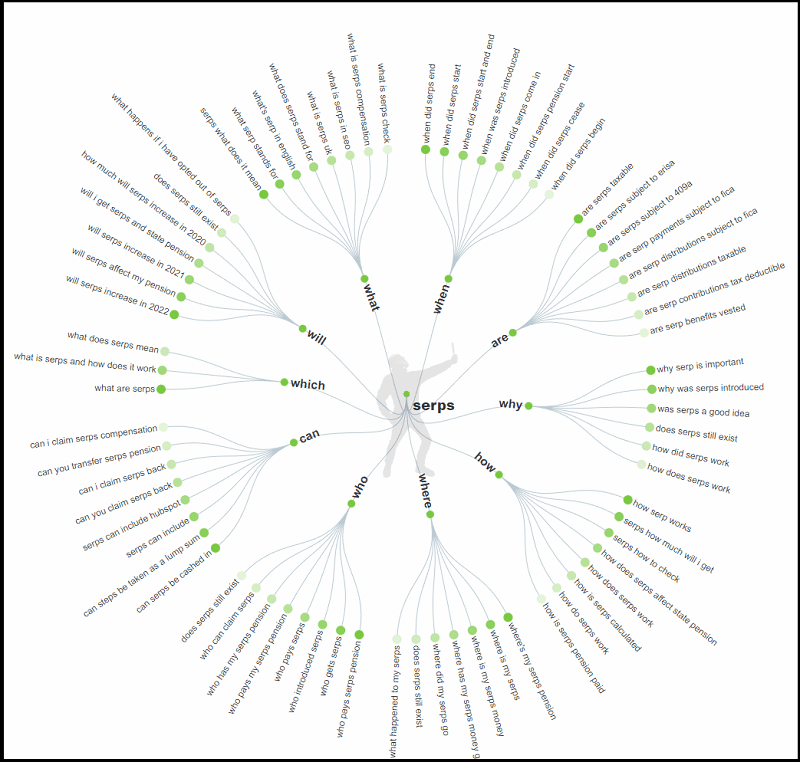
Decrease Your Site Loading Time
Site loading time is one of the most important SEO factors.
There are a few things you can do to decrease your site loading time:
- Optimize your images
- Use a content delivery network (CDN)
- Minify your HTML, CSS, and JavaScript files
- Leverage browser caching
SERPs FAQs
Q: What is the difference between SEO and SERP?
A: SEO is the process of optimizing a website to rank as high as possible in SERPs, while SERP stands for Search Engine Results Page and refers to the page that shows up after you type a query into a search engine.
Q: How do I improve my ranking on SERPs?
A: To improve your ranking on SERPs, you need to optimize your website for SEO. This involves optimizing content and meta tags, creating backlinks, improving core web vitals, covering a broad topic, and decreasing your site loading time.
Q: How do I check my listing on SERPs?
A: You can check your listing on SERPs by typing a keyword related to your website into the search engine and seeing where it appears. Additionally, you can use tools like Google Search Console or Ahrefs to track your SEO performance over time, and specific Chrome extensions.
Before You Go
Understanding how SERPs work is essential if you want to rank better on search engines.
Several factors go into SEO, but some of the most important ones are quality content and good backlinks.
But wait! Before you go, you may want to read about how to make the most out of your searches on Google:
Now, I would like to hear your two cents.
Do you have any questions about how SERPs work?
Let me know in the comments below!
Also, if you enjoyed this post, please share it with your friends!
And if you want to learn more about SEO, be sure to check out this collection of free resources.

Hello Erik,
SEO plays a great role in ranking a website on the search engine result pages. All you need is to work on your website both on-page and off-page SEO. It will help you to rank well in SERP. You have shared very helpful tips here. Thanks for this awesome post.
Regards,
Vishwajeet Kumar
Hi Vishwajeet,
thanks for being an ongoing supporter.
I appreciate your positive feedback!
Erik,
Thanks for the post kind of handful for a novice like me but glad you have “Learn SEO at Your Own Pace” I couldn’t get the CTR until I went to that link.
Hi Helaena,
your comment made my day. 🙂
So glad to have you helped.
I hope you can learn and get more insights by reading more of my content.
I agree with Helena.
SEO stuff is always a handful for beginners like me. But you make it easy to grasp. Thanks.
There’s always something new to learn, Winfred.
Especially in SEO.
Hi Erik,
Thanks again for another great instructional post. Every time I read your posts I learn something new. It’s great to share these posts too, which I will do.
It is important to know how SERPS actually work. This will make it easier to get traffic and click throughs to your website if you know how to do it right.
Thanks Again
Thanks for the awesome feedback.
It’s great to hear you are learning from these guides, Barrie.
An insightful breakdown of SERPs, Erik!
This guide provides a clear understanding of how search engine results pages function, making it easier to navigate the digital landscape.
Kudos for simplifying a complex topic.
Screenshots and images really help in describing the concept.
Thanks for the comment, Charles.
Fantastic guide on SERPs! I’ve always wondered how search engines determine the order of results on their pages. This article breaks down the complexities of Search Engine Results Pages in an easy-to-understand manner.
Hey Tulsi,
thanks for the nice feedback!
Excellent article, Erik!
I like how you stated right at the beginning, “But even if you rank number one for a specific keyword, not all results are the same.” That is such a key point.
And, your graphics really helped to drive the points home. Even if I already understand SEO, your article is worth reading again (and again)!
Thanks, Erik!
-Deb
Thanks for the awesome comment, Deb.
It’s good to hear you appreciated this SERPs guide. 🙂